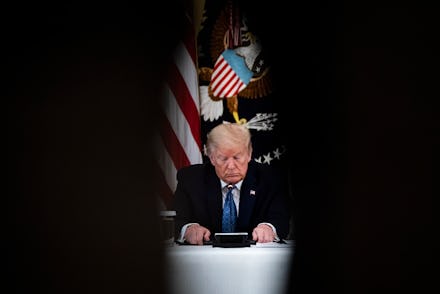The Bob Woodward revelation fallout is getting stupider by the day

As I write this, it's been about 24 hours since The Washington Post published excerpts and audio from journalist Bob Woodward's forthcoming book on the Trump administration — including, most damningly, audio of the president admitting that he "wanted to always play it down" in regards to the catastrophic dangers of the coronavirus pandemic.
Since then, fallout from Woodward's revelation that Trump knowingly lied to the public about the severity of the then-nascent pandemic has played out in both frustratingly predictable, and alarmingly uncharted patterns. As could have been expected, Democrats have seized upon the president's recorded comments — made in February and March, in the early stages of the pandemic's spread in the U.S. — as their latest election-season salvo against a man they have spent the past four years framing as dangerously, even criminally, incompetent and self-absorbed.
Republicans, meanwhile, have done one of the same three things they always seem to do after some damaging news about the president's latest self-inflicted screw-up becomes public: pretend not to notice, then either assemble into a circular firing squad of blame or simply fall in line, no matter how ridiculous and damning the president's actions may be.
To wit: For two days in a row, Iowa Sen. Joni Ernst claimed simply to have no idea what people were talking about when asked about the president's admitted deception. Louisiana Sen. John Kennedy took things a cringey step further during an interview with CNN, repeating his claim that "gotcha books don't really interest me that much" over and over again, like a bizarre benediction to shield himself from the crushing weight of, y'know, reality.
Over on Fox News, however, one president's most dedicated sycophants lined up to cast aspersions on one of president's other most dedicated sycophants who was, apparently, part of a subversive plot to "sabotage" Trump by helping arrange his 18-part interview with Woodward in the first place.
"Lindsey Graham is supposed to be a Republican, so why would he do something like that?” Carlson asked during Wednesday night's broadcast.
“You'd have to ask him," he continued. "Keep in mind that Lindsey Graham has opposed — passionately opposed — virtually every major policy initiative that Donald Trump articulated when he first ran, from ending illegal immigration, to pulling back from pointless wars, to maintaining law and order at home. Lindsey Graham was against all of that, more than many Democrats. So maybe you already know the answer.”
That MAGA fanatics would turn on Graham — one of the president's most reliable and credulous defenders — as a radical anarchist libtard is probably a sign that there is panic, or at least fewer safe havens for them to shelter in place, among the ranks of the president's most faithful.
Of course, there were those on the right who simply embraced the shameless serenity of unquestionably backing Trump, no matter how deranged or embarrassing it might be.
"When you're in a crisis, you've got to strike the right balance [and not create] a panic," Texas Sen. John Cornyn told CNN's Manu Raju, echoing White House Press Secretary Kayleigh McEnany's claim that "the president has never lied to the American public on [COVID-19]. The president was expressing calm, and his actions reflect that."
Meanwhile, Trump himself doubled-down on his comments to Woodward, claiming that if his statements were "so bad or dangerous" then Woodward should and would have made them public immediately, rather than sit on them for months.
Trump's "well, then why didn't anyone stop me?" admission notwithstanding, it is true that had Woodward made the president's comments public at the time, it would very likely have applied enough political pressure on the White House to actually act to save lives during the early stages of the pandemic, rather than to refuse to support common public health guidances like mask-wearing and social distancing. This would've particularly benefited the president's supporters who followed Trump's lead in minimizing the risks and declining to take precautions.
If anything, the president's tweet is part and parcel of the same hubris that seemingly led Trump into blurting out his own culpability in the first place. If there is one thing the president has utmost and unwavering faith in, it's himself — there's no crisis he can't simply talk his way out of and no danger he can't Trump himself through by sheer willpower alone. His infamous declaration that "I alone can fix it" wasn't simply a pitch to Republican voters, it was a reminder to himself of his own infallibility.
These are the dynamics which will likely follow us through to Election Day in two months. Will they be enough to actually affect the president's standing in the polls, and shake his otherwise immovable base of supporters? I wouldn't hold my breath.